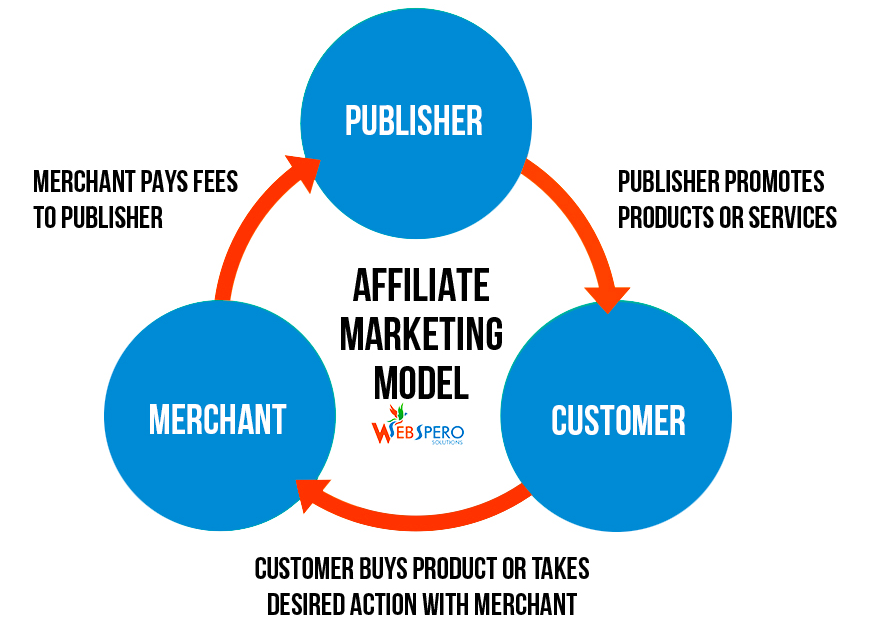
Affiliate marketing is a popular online business model that allows you to earn a commission by promoting other people’s products or services. It’s a win-win situation because you get to make a profit without having to create your own products, and the creators of those products get exposure and sales through your efforts. If you’re curious about how affiliate marketing works and how you can get started, this article will provide you with all the basics you need to know.
In this article, you’ll learn about the different players involved in affiliate marketing, such as affiliates (that’s you!), merchants, and customers. You’ll also discover the various strategies and methods that affiliates use to promote products and earn commissions. Additionally, you’ll get a glimpse into the potential benefits and challenges of affiliate marketing, so you can determine if it’s the right fit for you. So, if you’re ready to dive into the exciting world of affiliate marketing and explore how you can turn your passion into profits, keep reading!
Definition of Affiliate Marketing
Affiliate marketing is a performance-based marketing strategy where individuals or businesses promote products or services of other companies and earn a commission for each sale, click, or lead that is generated through their marketing efforts. It is a mutually beneficial arrangement where affiliates, also known as publishers or partners, use various marketing tactics to drive traffic and sales to the merchant’s website.
Understanding the Concept
To understand affiliate marketing, it is important to grasp the concept of affiliate programs. These programs are offered by merchants who are looking to expand their customer base and increase their sales. They collaborate with affiliates who have a platform or audience that aligns with their target market. Affiliates then promote the merchant’s products or services through various marketing channels, such as websites, blogs, social media, or email marketing.
How Affiliate Marketing Works
Affiliate marketing works on a revenue-sharing model, where affiliates earn a commission for each successful conversion they generate. The commission structure varies depending on the agreed terms between the merchant and the affiliate. It can be based on a percentage of the sale amount (pay per sale), a flat fee for each click generated (pay per click), or a fixed amount for each lead acquired (pay per lead).
Affiliates use personalized tracking links or codes provided by the merchant to track and record their referral activity. When a user clicks on an affiliate’s tracking link and makes a purchase, the affiliate’s unique code is recorded, and the commission is attributed to the affiliate’s account.
Role of Affiliates and Merchants
Affiliates play a crucial role in affiliate marketing as they act as intermediaries between the merchant and the customer. They leverage their own platforms, such as websites or social media accounts, to promote the merchant’s products or services to their audience. Affiliates use various marketing strategies, such as content creation, email marketing, or paid advertising, to drive traffic and encourage conversions.
On the other hand, merchants benefit from the affiliate’s marketing efforts by gaining exposure to a wider audience and potentially acquiring new customers. Instead of investing in traditional marketing methods, merchants can leverage the affiliate’s existing platform and only pay for marketing efforts that result in conversions.
Benefits and Advantages of Affiliate Marketing
Lucrative Income Opportunities
One of the biggest advantages of affiliate marketing is the potential for lucrative income opportunities. Affiliates can earn a significant amount of money by promoting high-converting products or services. As the affiliate’s efforts are directly correlated with their earnings, they have the opportunity to scale their income by increasing their marketing efforts or focusing on products with higher commission rates.
Low Start-up Costs
Affiliate marketing is an ideal business model for those who are looking to start an online business with minimal investment. Unlike starting a traditional brick-and-mortar store, affiliate marketers do not need to invest in inventory, product development, or shipping logistics. The affiliate’s main responsibility is to drive traffic and conversions, while the merchant takes care of product fulfillment and customer service.
Flexibility and Freedom
Affiliate marketing offers a high level of flexibility and freedom for affiliates. They have the freedom to choose the products or services they want to promote, as well as the marketing strategies they want to implement. Affiliates can work from anywhere in the world as long as they have an internet connection, allowing them to have a flexible lifestyle and work on their own terms.
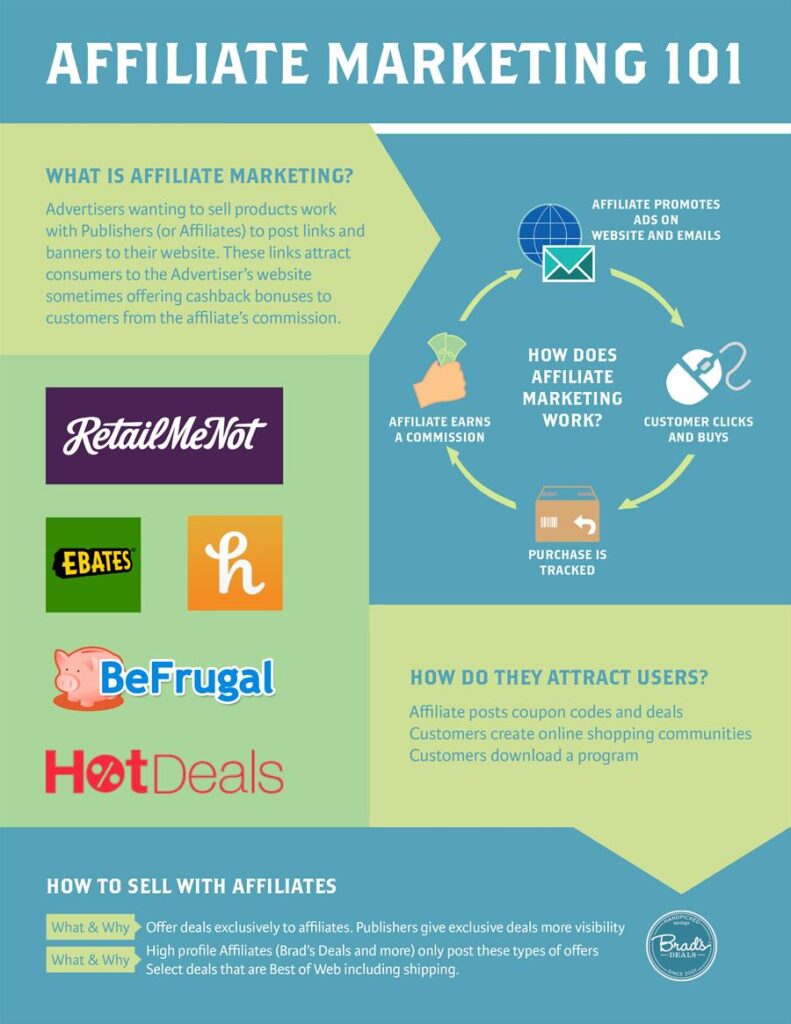
Different Types of Affiliate Marketing
Pay Per Sale (PPS)
Pay per sale is the most common type of affiliate marketing. Under this model, affiliates earn a commission for each sale they generate through their promotional efforts. The commission is usually a percentage of the sale amount and can range from a few percent to as high as 50% or more for digital products. Pay per sale is a popular choice among affiliates as it offers the highest earning potential.
Pay Per Click (PPC)
Pay per click is a type of affiliate marketing where affiliates earn a commission for each click they generate on the merchant’s link. Unlike pay per sale, the commission is not dependent on the conversion or sale; it is merely based on the number of clicks. PPC is commonly used in contexts where the focus is on driving traffic to the merchant’s website rather than driving direct sales.
Pay Per Lead (PPL)
Pay per lead is another type of affiliate marketing where affiliates earn a commission for each lead they generate for the merchant. A lead refers to an action taken by a potential customer, such as filling out a form, signing up for a newsletter, or requesting a free trial. Pay per lead programs are popular in industries where capturing leads is critical for converting them into customers.
Successful Strategies in Affiliate Marketing
Identifying Profitable Niches
To succeed in affiliate marketing, it is crucial to identify profitable niches in the market. A niche is a specific segment or target audience that has particular needs or interests. By focusing on a niche market, affiliates can position themselves as experts and build a loyal following. It is important to conduct market research and identify niches with high demand and low competition to maximize profitability.
Choosing the Right Affiliate Programs
Choosing the right affiliate programs is a key factor in the success of affiliate marketing. Affiliates should carefully evaluate the merchant’s reputation, product quality, commission structure, and affiliate support. It is essential to partner with reliable and reputable merchants that offer products or services with high conversion potential. Affiliates should also consider the merchant’s payment terms and track record for timely payments.
Creating Compelling Content
Content creation is a fundamental strategy in affiliate marketing. Affiliates should focus on creating high-quality, valuable, and engaging content that resonates with their target audience. Whether it is through blog posts, product reviews, videos, or social media posts, affiliates should aim to provide informative and helpful content that drives conversions. Compelling content builds trust and credibility with the audience, increasing the likelihood of successful conversions.
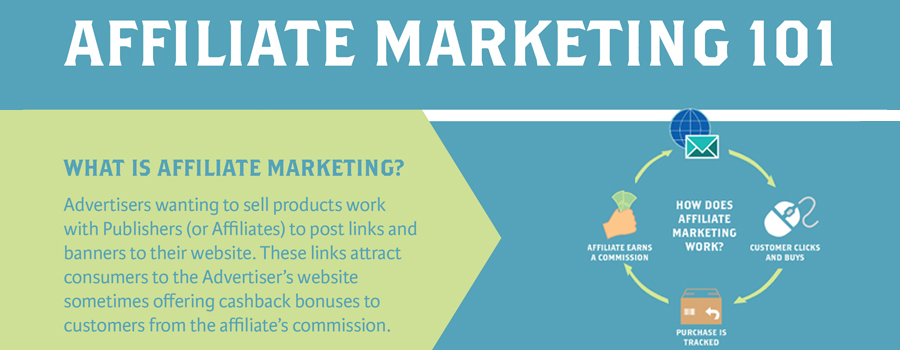
Building and Managing Affiliate Relationships
Establishing Trust with Affiliates
Building and nurturing strong relationships with affiliates is crucial for long-term success in affiliate marketing. Affiliates are more likely to promote products or services of merchants who provide excellent support, transparent communication, and fair commission structures. Merchants should establish trust by being responsive to affiliate inquiries, providing promotional materials and resources, and offering fair compensation for their efforts.
Providing Adequate Support and Resources
Merchants should ensure that affiliates have access to the necessary tools and resources to effectively promote their products or services. This includes providing affiliates with banners, text links, product images, and other promotional materials they can use on their websites or social media accounts. Merchants should also provide regular updates, product information, and marketing guidelines to help affiliates optimize their promotional efforts.
Tracking Performance and Payments
Tracking affiliate performance and timely payments are essential for maintaining strong relationships with affiliates. Merchants should provide affiliates with reliable tracking systems that accurately record clicks, leads, and sales generated by each affiliate. The tracking system should provide affiliates with real-time reports and statistics to evaluate the performance of their campaigns. Timely and accurate payments contribute to building trust and loyalty among affiliates.
Challenges in Affiliate Marketing
Competition and Saturation
One of the challenges in affiliate marketing is the level of competition in the industry. With the ease of entry and low start-up costs, the market can quickly become saturated with affiliates promoting the same products or services. Affiliates need to find unique angles, niches, or marketing strategies to differentiate themselves from the competition and capture the attention of their target audience.
Adapting to Market Changes
Affiliate marketing is a dynamic industry that is constantly evolving. Affiliates need to stay updated with the latest industry trends, consumer behavior, and marketing strategies. They should be willing to adapt and change their approach depending on market demands. Affiliates need to continuously test and optimize their campaigns to ensure they are effective and relevant in the ever-changing market landscape.
Maintaining Affiliate Relationships
Building and maintaining strong affiliate relationships require continuous effort and communication. Affiliates may be working with multiple merchants simultaneously, and it is important for merchants to stand out and provide exceptional support and incentives. Merchants should regularly communicate with affiliates, provide them with timely updates and promotional opportunities, and address any issues or concerns they may have.
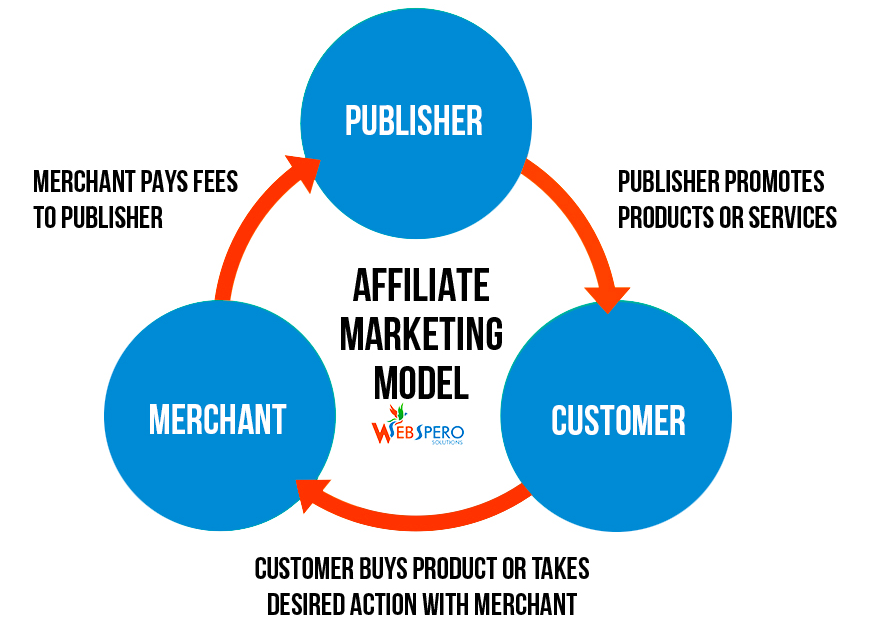
Tools and Resources for Affiliate Marketers
Affiliate Networks
Affiliate networks are platforms that connect affiliates with merchants. They provide a centralized marketplace where affiliates can find a wide range of affiliate programs to join. Affiliate networks provide tracking and reporting tools, as well as facilitate commission payments. Some popular affiliate networks include Amazon Associates, ShareASale, and CJ Affiliate.
Tracking and Analytics Tools
Tracking and analytics tools are crucial for affiliates to monitor the performance of their campaigns. These tools provide real-time data on clicks, leads, conversions, and commissions earned. Popular tracking tools include Google Analytics, Voluum, and ClickMeter. Affiliates can use these tools to optimize their campaigns, identify top-performing marketing channels, and track their return on investment.
SEO and Content Creation Tools
Search engine optimization (SEO) and content creation are integral parts of affiliate marketing. Affiliates can leverage SEO tools to conduct keyword research, optimize their website or blog for search engines, and increase organic traffic. Content creation tools, such as WordPress, Canva, or video editing software, can help affiliates create visually appealing and engaging content for their audience.
Legal and Ethical Considerations in Affiliate Marketing
Disclosure and Transparency
Transparency and disclosure are essential in affiliate marketing to maintain trust and comply with legal regulations. Affiliates should clearly disclose their affiliate relationship with the merchant and inform their audience that they may receive a commission for their recommendations or endorsements. Disclosure can be done through disclaimers, prominently placed affiliate disclosure statements, or specific labeling of affiliate links.
Compliance with FTC Guidelines
Affiliate marketers operating in the United States should be aware of and comply with the Federal Trade Commission (FTC) guidelines. The FTC requires affiliates to disclose their relationship with the merchant and ensure that their endorsements or testimonials are truthful and not misleading to consumers. Failure to comply with these guidelines can result in legal consequences and damage to the affiliate’s reputation.
Avoiding Unethical Practices
Maintaining ethical practices is essential for long-term success in affiliate marketing. Affiliates should avoid using deceitful tactics, such as cookie stuffing, spamming, or false advertising, to generate clicks or sales. Building trust and credibility with the audience should always be the primary focus, and affiliates should ensure that their marketing practices are aligned with ethical standards and guidelines.
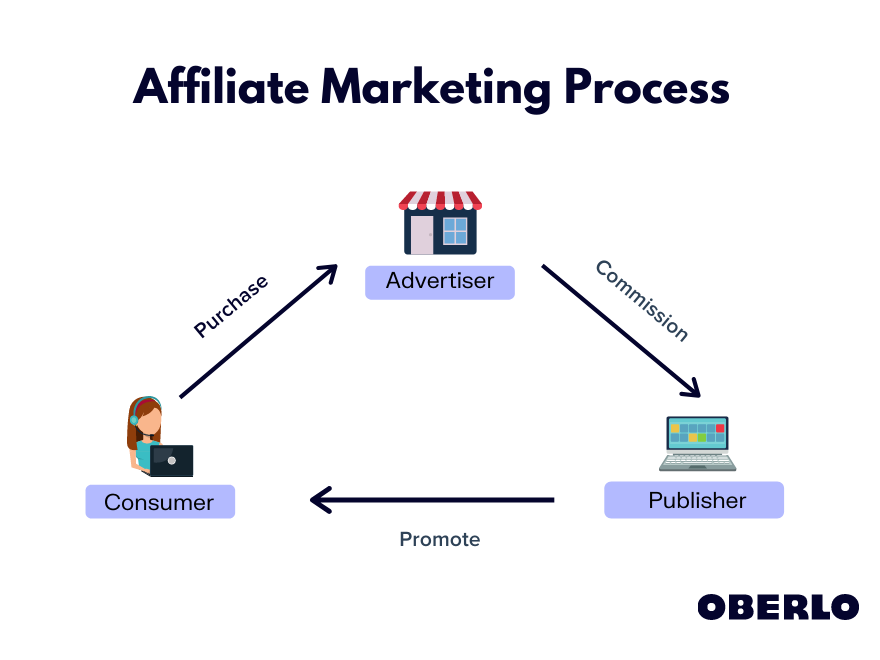
Future Trends and Innovations in Affiliate Marketing
Influencer Marketing Integration
The integration of influencer marketing with affiliate marketing is a growing trend. Influencers leverage their following and personal brand to promote products or services as affiliates. This combination allows them to provide authentic recommendations and reach a wider audience, resulting in increased conversions for merchants.
Mobile Commerce and Affiliate Apps
With the rise of mobile usage, mobile commerce and affiliate apps are becoming more prevalent in the affiliate marketing landscape. Affiliates can create mobile apps or optimize their websites for mobile devices to reach users who prefer to shop or browse on their smartphones. Mobile-friendly platforms and apps offer convenience and ease of use, leading to higher conversion rates.
AI and Automation
Artificial intelligence (AI) and automation are transforming the affiliate marketing industry. AI-powered tools can analyze data, optimize campaigns, and provide personalized recommendations to affiliates. Automation streamlines manual tasks, such as tracking conversions or sending emails, freeing up time and resources for affiliates to focus on higher-value activities.
Conclusion
Affiliate marketing offers individuals and businesses a unique opportunity to earn income by promoting products or services of other companies. By understanding the concept, benefits, strategies, and challenges of affiliate marketing, you can embark on a journey to generate passive income and establish a thriving online business. Remember to choose the right affiliate programs, build strong relationships, provide valuable content, and stay ethical and transparent in your marketing efforts. Keep up with the latest trends and innovations to stay ahead in the competitive affiliate marketing industry.


